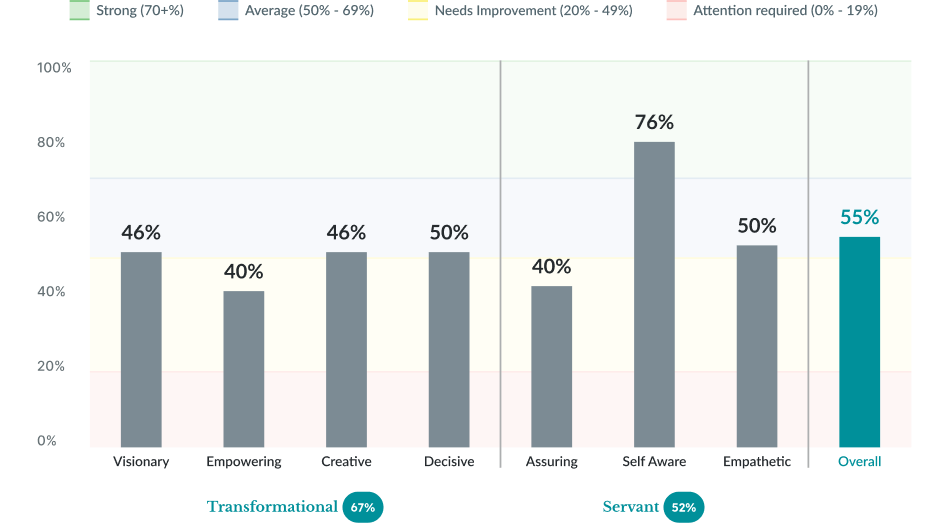
At Skills Analysis, we understand that effective leadership transcends mere personality traits. Traditional assessments often narrowly define individuals by characteristics like extroversion or agreeableness, overlooking essential components of true leadership effectiveness.
Our innovative approach, anchored in Behavioral Science and Organizational Psychology, offers insights that are both accurate and transformative. By focusing on fundamental leadership competencies, we provide you with the tools necessary to enhance your leadership capability in today’s complex business environment.


Most traditional leadership assessments focus primarily on personality-based metrics, often assuming that traits such as charisma or sociability determine a person’s leadership potential. However, this narrow view overlooks key scientific insights: effective leadership is not confined to fixed personality traits but is instead shaped by a combination of behaviors, decisions, and competencies. Zaccaro and Banks (2004)1 emphasize that while personality may influence leadership emergence, it is specific competencies that ultimately drive successful leadership outcomes.
Research by Kirkpatrick and Locke (1991)2 suggests that although certain traits may provide advantages, they cannot substitute for the critical role of demonstrable leadership behaviors. This perspective aligns with Boyatzis (1982)3, whose foundational work highlights that competencies—encompassing both skills and behaviors—are far more predictive of managerial success than personality alone.
Our model emphasizes two critical categories of leadership competencies:
This style of leadership fosters creativity, decisiveness, and the capacity to inspire and mobilize others toward a shared vision. By encouraging innovation and driving positive change, such leaders demonstrate exceptional effectiveness in navigating organizational challenges, as noted by Bass (1999)4.
Focusing on empathy, self-awareness, and a commitment to serving others, servant leaders prioritize the growth and well-being of their teams, as supported by Coetzer, Bussin, and Geldenhuys (2017)5. By doing so, they strengthen engagement and build trust within their organizations.
Our proprietary Skills Analysis assessment revolutionizes how we evaluate leadership potential by moving beyond the restrictions of personality-driven evaluations. Our approach establishes a new standard with its three defining key characteristics.
Skills analysis evaluates behavioral responses that directly correspond to leadership competencies outlined by Rhodabarger (2024)6 within the framework of servant and transformational values. It illustrates how leaders can intentionally cultivate essential skills—such as empathy, vision-setting, and creative engagement—regardless of their natural personality traits.
Our assessment consists of multiple variations of 50 carefully designed scenarios that reflect real-world leadership challenges, limiting opportunities for manipulation and providing genuine insights into leadership style. This authenticity is critical, as Mann (1996)7 emphasizes the central role of leadership behaviors in organizational contexts.
By contrasting behavioral tendencies with leadership competencies, skills analysis uncovers critical insights: actions that may appear instinctive or logical in a leadership setting can, in fact, diverge from effective practices. This awareness enables leaders to identify and bridge performance gaps, as emphasized by Dunning, Leuenberger, and Sherman (1995)8.
The true value of Skills Analysis lies within its comprehensive report. Upon completing the assessment, you receive a detailed analysis featuring two graphs based on your responses. They illustrate your levels in seven key leadership competencies, including Servant and Transformational Leadership, alongside a chart categorizing your behavioral tendencies in relation to these competencies.

Don’t settle for generic personality assessments that limit your potential. Choose Skills Analysis for a comprehensive, behavior-focused evaluation grounded in extensive research and scientific rigor.
Take the first step and unlock the power of what it means to lead successfully!
Get Started

1 Zaccaro, S. J., & Banks, D. (2004). Leader emergence and the role of personality. The Leadership Quarterly, 15(2), 307–331.
2 Kirkpatrick, S. A., & Locke, E. A. (1991). Leadership: Do traits matter? The Executive, 5(2), 48–60. Academy of Management.
3 Boyatzis, R. E. (1982). The competent manager: A model for effective performance. New York, NY: Wiley.
4 Bass, B. M. (1999). Two decades of research and development in transformational leadership. European Journal of Work and Organizational Psychology, 8(1), 9–32.
5 Coetzer, M. F., Bussin, M., & Geldenhuys, M. (2017). The functions of a servant leader. Administrative Sciences, 7(1), 5.
6 Rhodabarger, M. (2024). The Chameleon Effect: Counterintuitive Leadership. Barnes & Noble Press. (pp. 127-187)
7 Mann, L. (1996). International Journal of Public Sector Management. The Role of Leadership in Performance Management.
8 Dunning, D., Leuenberger, A., & Sherman, D. K. (1995). Who Is the 'Most Competent'? Journal of Personality and Social Psychology, 68(3), 465-478.
Avolio, B. J., & Gardner, W. L. (2005). "Authentic Leadership Development: Getting to the Root of Positive Forms of Leadership." The Leadership Quarterly, 16(3), 315-338.
Bennis, W. (2009). On Becoming a Leader. Perseus Books.
Buchanan, D. A., & Huczynski, A. (2017). Organizational Behaviour (9th ed.). Pearson.
Conger, J. A. (1992). "Learning to Lead: The Challenges of Leadership Education and Development." The Executive, 6(2), 14-22.
Fletcher, J. K. (2004). "The Future of Leadership: The 'New' Leadership Paradigm." The Leadership Quarterly, 15(5), 609-618.
Gardner, W. L., Avolio, B. J., Luthans, F., Walumbwa, F. O., & May, D. R. (2005). "Can You See the Real Me? A Self-Based Model of Authentic Leader and Follower Development." The Leadership Quarterly, 16(3), 343-372.
Goffee, R., & Jones, G. (2006). "Why Should Anyone Be Led by You?." Harvard Business Review, 84(5), 62-70.
Goleman, D. (1998). Working with Emotional Intelligence. Bantam Books.
Hackman, J. R., & Wageman, R. (2005). "When and How Team Leaders Matter." The Sage Handbook of Leadership (pp. 115-138).
Hale, J. R., & Fields, D. L. (2007). "Leadership, Personality, and the Influence of Context on Group Performance." The Leadership Quarterly, 18(4), 541-560.
Heifetz, R. A., & Linsky, M. (2002). Leadership on the Line: Staying Alive through the Dangers of Leadership. Harvard Business Review Press.
Kirkpatrick, S. A., & Locke, E. A. (1996). "Direct and Indirect Effects of Leader Traits and Behaviors on Group Performance." Journal of Applied Psychology, 81(1), 12-24.
Luthans, F., & Avolio, B. J. (2003). "Authentic Leadership Development." Positive Organizational Scholarship.
Mumford, M. D., Zaccaro, S. J., Harding, F. D., Fleishman, E. A., & Jacobs, T. O. (2000). "Leadership Skills for a Changing World: Solving Complex Social Problems." The Leadership Quarterly, 11(1), 11-35.
Morgeson, F. P., Delaney-Klinger, K., & Hemingway, M. A. (2005). "The Importance of Team Leadership in Delivering Business Value." The Leadership Quarterly, 16(6), 689-706.
Nahrgang, J. D., Morgeson, F. P., & Hofmann, D. A. (2011). "Safety at Work: A Meta-analytic Investigation of the Relationship between Organizational Culture and Safety Outcomes." Journal of Applied Psychology, 96(2), 322-340.
Northouse, P. G. (2018). Leadership: Theory and Practice (8th ed.). SAGE Publications.
Rost, J. C. (1991). Leadership for the Twenty-First Century. Westport, CT: Praeger.
Schein, E. H. (2010). Organizational Culture and Leadership (4th ed.). Jossey-Bass.